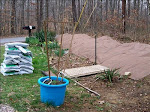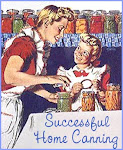Last week I was contacted by Hometown Seeds, a new organization that sells vegetable, flower, and herb seed packets to home gardeners throughout the world. Hometown Seeds offers a variety of premium quality seed and supplies.
Most of you know I’m a real fan of seeds. They store well, they don’t take up much space, and when you put them in the ground they grow into the loveliest things. My friend Elle Bobier says, “A miracle is a few seeds sprouting in a clay pot.” I asked Scott Peterson, owner/partner (along with Jared West) a few questions that turned into a lovely interview I wanted to share with you here.

Caroline: How did you find our blog? Were you part of Sharon’s food storage group?
Scott: We are constantly educating ourselves and looking for ways to connect with our customers. Reading blogs is one way we do that. We found your blog by searching garden blogs.
Caroline: How did you organize Hometown Seeds?
Hometown Seeds is a partnership between me (Scott Peterson) and Jared West. We have civil engineering backgrounds and have worked together on several projects. We both have used gardening as a way to unwind and spend time with our family. Incidentally, Jared is by far better at feeding the family from his garden. A key to our success is our good wives who have supported us and allowed us to take a pretty crazy career detour.
Caroline: Where do the seed come from?
They come from different growers across the country. A key reason we were able to create the company was our relation with a wholesaler that has been developing relationships with a variety of high quality seed producers. We also rely on our supplier for his wealth of knowledge. He has college degrees in plant science and has spent over 55 years growing, testing, and researching seeds. We rely heavily on his expertise as a vital partner in our company.
Caroline: Are there instructions with the seed? What about instructions for starting flats indoors?
We do provide general planting instructions with the seeds such as spacing, germination, row spacing, etc. We don’t have instructions on starting flats indoors but that’s a great idea.
Caroline: What is your background as far as growing and plant knowledge goes? Do you come from a farm background? Did your parents garden?
My gardening background was not formal. I grew up in a small town of about 8,000 people. I was the seventh of eight children. We weren’t wealthy and lived on a small lot. There always seemed to be a widow with a large garden plot willing to let us rent. Rent was always the produce, so the widow always got paid a portion of our crop. I learned gardening but I think my parents understood the other benefits. I became close friends with these ladies and learned to appreciate the experiences they had lived through. I was given weeding responsibilities to do on my own so I have memories of getting half way through my job and being distracted as I ate a vine ripened tomato (my favorite), fresh peas, or strawberries.
As far as plant knowledge, I have learned it on the way as a hobby. Since we decided to turn our hobby into a business, I have learned a lot more and also found some local experts that have been gracious with their time in helping us with things such as product mix, quality standards, sourcing, etc.
Caroline: You have a special category for survival seeds. What does the term “survival seed” mean?
Survival seeds are a familiar term these days for a long-term seed bank. These are open-pollinated, non-hybrid seeds that you can use to grow a food crop as well as save seeds to replant the same crop again the next year. If there are food shortages, you can “survive.”
Caroline: How did you get interested in survival issues?
Growing up, my parents always stored a one-year supply of food. This was for a rainy day or emergency. This was religiously motivated. They believed that if they did their part to prepare, God would take care of the rest in a time of need. A time of need could include loss of employment, a natural disaster, or in these days, a recession where earning ability may be hampered. It engrained in me a preparedness mentality so that I live below my means. There have been several times where this practice has served my family well.
Caroline: Do survival seeded plants require more care than regular seed plants?
No, even a novice gardener could grow them. We have added a detailed instruction book with each packet in case a customer has any questions. Our selection has been chosen to grow in a variety of climates and, to the extent possible, utilize shorter growing seasons.
Caroline: What do you say to people who claim you are using scare tactics to sell your survival seeds?
I don’t think we are. As I mentioned before, the title “survival seeds” is what many people would call our product, regardless of what we name it. We want to connect our customers with the product, so we go with what works. We do want people to be prepared and hopefully they consider this aspect if they know how to garden.
Caroline: Survival Gardens are very much like the Victory Gardens of the 1940s. Why not promote your product as a modern-day Victory Garden? Do you see a similarity between the two?
I do see the similarity and have read your experience about Mr. Brown’s victory garden. I agree that is a much more positive name, but the way we generate sales is when our customers search a website with terms that include emergency seeds, survival seeds, long term storage seeds, and others. I am afraid if we marketed a victory garden kit, our customers would not be able to find us.
Caroline: How are your seeds packaged? How long a shelf life do the seeds have?
They have a double waterproof package. The individual seed types are sealed in poly bags. All of the individual seeds are then heat sealed in a heavy gauge Mylar bag., which ensures a dark environment that is moisture proof. The shelf life is a minimum of 5 years at room temperature, but the cooler the better. If you freeze them, you can double the shelf life.
Caroline: Are these seeds considered GMO? What does that mean?
All of our seeds are 100% GMO free. Genetically modified organisms (GMO) seeds have a lot of unknown consequences and we feel more research should have been done before they were made commercially available. This is the reason we don’t carry GMO seeds.
Caroline: Why do non-GMO seeds cost more than conventional seed?
We provide a better value. If you compare our seeds to what you buy in a big box store, you will see the difference in the results. Our customers won’t be in the position of having poor seed germination and miss their planting window for the year. This isn’t a value. If you buy the right seeds your return is enormous. For every dollar you spend on seed, the average return is $20 of produce. This illustrates the value of good seeds. We believe we are correct in our slogan, more garden for your dollar.
As far as the survival pack, we are one of the most affordable products on the market. This is a great value for the larger quantities of open pollinated varieties. Some of the varieties such as the corn and cucumbers are in short supply this year. The pack contains enough seed to plant ¾ acre!
Caroline: How do you determine what seeds go into a survival bundle?
We considered the worst case of a family living only on these vegetables. With that in mind, we picked items that would have varying tastes, textures, and nutritional value. This was done with a lot of input from colleagues and our supplier. It had to meet our criteria and also be available in pretty substantial quantities.
Caroline: I notice you also have fun seed, like popcorn, and gourds. Will you be adding others?
We are always interested in the unusual. I like to plant something I’ve never tried each year in the garden. We are always open to ideas for new products.
Caroline: There’s a link for Discount Coupons on your site. How does one get a discount coupon? Would you like to offer a discount for people who visit you from my site?
This is a very new feature we are still working on. We will be offering a code for just these reasons, just need to work out our glitch. I will follow up with you on this.
Caroline: Is your company connected to any charity work?
We currently aren’t on a company level. Jared and I spend a lot of time working with our respective church groups but we have not yet implemented charity work into our company.
Hometown Seeds can be found at http://www.hometownseeds.com/. They have promised me the emergency survival seeds package that is worth $34.99 +shipping. Check it out at http://hometownseeds.com/survival-seeds-c-213/emergency-food-storage-seeds-p-35 . I’ll report several times on the seed kit, letting you know how the seed are shipped, how I used them, photos of all stages of my survival seed garden, and finally, my personal gardener’s opinion about the seed kit.
Thanks to the folks at Home town Seeds for contacting me. I’m always so glad to hear from people who have read my blog.
Most of you know I’m a real fan of seeds. They store well, they don’t take up much space, and when you put them in the ground they grow into the loveliest things. My friend Elle Bobier says, “A miracle is a few seeds sprouting in a clay pot.” I asked Scott Peterson, owner/partner (along with Jared West) a few questions that turned into a lovely interview I wanted to share with you here.

Caroline: How did you find our blog? Were you part of Sharon’s food storage group?
Scott: We are constantly educating ourselves and looking for ways to connect with our customers. Reading blogs is one way we do that. We found your blog by searching garden blogs.
Caroline: How did you organize Hometown Seeds?
Hometown Seeds is a partnership between me (Scott Peterson) and Jared West. We have civil engineering backgrounds and have worked together on several projects. We both have used gardening as a way to unwind and spend time with our family. Incidentally, Jared is by far better at feeding the family from his garden. A key to our success is our good wives who have supported us and allowed us to take a pretty crazy career detour.
Caroline: Where do the seed come from?
They come from different growers across the country. A key reason we were able to create the company was our relation with a wholesaler that has been developing relationships with a variety of high quality seed producers. We also rely on our supplier for his wealth of knowledge. He has college degrees in plant science and has spent over 55 years growing, testing, and researching seeds. We rely heavily on his expertise as a vital partner in our company.
Caroline: Are there instructions with the seed? What about instructions for starting flats indoors?
We do provide general planting instructions with the seeds such as spacing, germination, row spacing, etc. We don’t have instructions on starting flats indoors but that’s a great idea.
Caroline: What is your background as far as growing and plant knowledge goes? Do you come from a farm background? Did your parents garden?
My gardening background was not formal. I grew up in a small town of about 8,000 people. I was the seventh of eight children. We weren’t wealthy and lived on a small lot. There always seemed to be a widow with a large garden plot willing to let us rent. Rent was always the produce, so the widow always got paid a portion of our crop. I learned gardening but I think my parents understood the other benefits. I became close friends with these ladies and learned to appreciate the experiences they had lived through. I was given weeding responsibilities to do on my own so I have memories of getting half way through my job and being distracted as I ate a vine ripened tomato (my favorite), fresh peas, or strawberries.

As far as plant knowledge, I have learned it on the way as a hobby. Since we decided to turn our hobby into a business, I have learned a lot more and also found some local experts that have been gracious with their time in helping us with things such as product mix, quality standards, sourcing, etc.
Caroline: You have a special category for survival seeds. What does the term “survival seed” mean?
Survival seeds are a familiar term these days for a long-term seed bank. These are open-pollinated, non-hybrid seeds that you can use to grow a food crop as well as save seeds to replant the same crop again the next year. If there are food shortages, you can “survive.”
Caroline: How did you get interested in survival issues?
Growing up, my parents always stored a one-year supply of food. This was for a rainy day or emergency. This was religiously motivated. They believed that if they did their part to prepare, God would take care of the rest in a time of need. A time of need could include loss of employment, a natural disaster, or in these days, a recession where earning ability may be hampered. It engrained in me a preparedness mentality so that I live below my means. There have been several times where this practice has served my family well.
Caroline: Do survival seeded plants require more care than regular seed plants?
No, even a novice gardener could grow them. We have added a detailed instruction book with each packet in case a customer has any questions. Our selection has been chosen to grow in a variety of climates and, to the extent possible, utilize shorter growing seasons.
Caroline: What do you say to people who claim you are using scare tactics to sell your survival seeds?
I don’t think we are. As I mentioned before, the title “survival seeds” is what many people would call our product, regardless of what we name it. We want to connect our customers with the product, so we go with what works. We do want people to be prepared and hopefully they consider this aspect if they know how to garden.
Caroline: Survival Gardens are very much like the Victory Gardens of the 1940s. Why not promote your product as a modern-day Victory Garden? Do you see a similarity between the two?
I do see the similarity and have read your experience about Mr. Brown’s victory garden. I agree that is a much more positive name, but the way we generate sales is when our customers search a website with terms that include emergency seeds, survival seeds, long term storage seeds, and others. I am afraid if we marketed a victory garden kit, our customers would not be able to find us.
Caroline: How are your seeds packaged? How long a shelf life do the seeds have?
They have a double waterproof package. The individual seed types are sealed in poly bags. All of the individual seeds are then heat sealed in a heavy gauge Mylar bag., which ensures a dark environment that is moisture proof. The shelf life is a minimum of 5 years at room temperature, but the cooler the better. If you freeze them, you can double the shelf life.
Caroline: Are these seeds considered GMO? What does that mean?
All of our seeds are 100% GMO free. Genetically modified organisms (GMO) seeds have a lot of unknown consequences and we feel more research should have been done before they were made commercially available. This is the reason we don’t carry GMO seeds.
Caroline: Why do non-GMO seeds cost more than conventional seed?
We provide a better value. If you compare our seeds to what you buy in a big box store, you will see the difference in the results. Our customers won’t be in the position of having poor seed germination and miss their planting window for the year. This isn’t a value. If you buy the right seeds your return is enormous. For every dollar you spend on seed, the average return is $20 of produce. This illustrates the value of good seeds. We believe we are correct in our slogan, more garden for your dollar.
As far as the survival pack, we are one of the most affordable products on the market. This is a great value for the larger quantities of open pollinated varieties. Some of the varieties such as the corn and cucumbers are in short supply this year. The pack contains enough seed to plant ¾ acre!
Caroline: How do you determine what seeds go into a survival bundle?
We considered the worst case of a family living only on these vegetables. With that in mind, we picked items that would have varying tastes, textures, and nutritional value. This was done with a lot of input from colleagues and our supplier. It had to meet our criteria and also be available in pretty substantial quantities.
Caroline: I notice you also have fun seed, like popcorn, and gourds. Will you be adding others?
We are always interested in the unusual. I like to plant something I’ve never tried each year in the garden. We are always open to ideas for new products.
Caroline: There’s a link for Discount Coupons on your site. How does one get a discount coupon? Would you like to offer a discount for people who visit you from my site?
This is a very new feature we are still working on. We will be offering a code for just these reasons, just need to work out our glitch. I will follow up with you on this.
Caroline: Is your company connected to any charity work?
We currently aren’t on a company level. Jared and I spend a lot of time working with our respective church groups but we have not yet implemented charity work into our company.
Hometown Seeds can be found at http://www.hometownseeds.com/. They have promised me the emergency survival seeds package that is worth $34.99 +shipping. Check it out at http://hometownseeds.com/survival-seeds-c-213/emergency-food-storage-seeds-p-35 . I’ll report several times on the seed kit, letting you know how the seed are shipped, how I used them, photos of all stages of my survival seed garden, and finally, my personal gardener’s opinion about the seed kit.
Thanks to the folks at Home town Seeds for contacting me. I’m always so glad to hear from people who have read my blog.

















